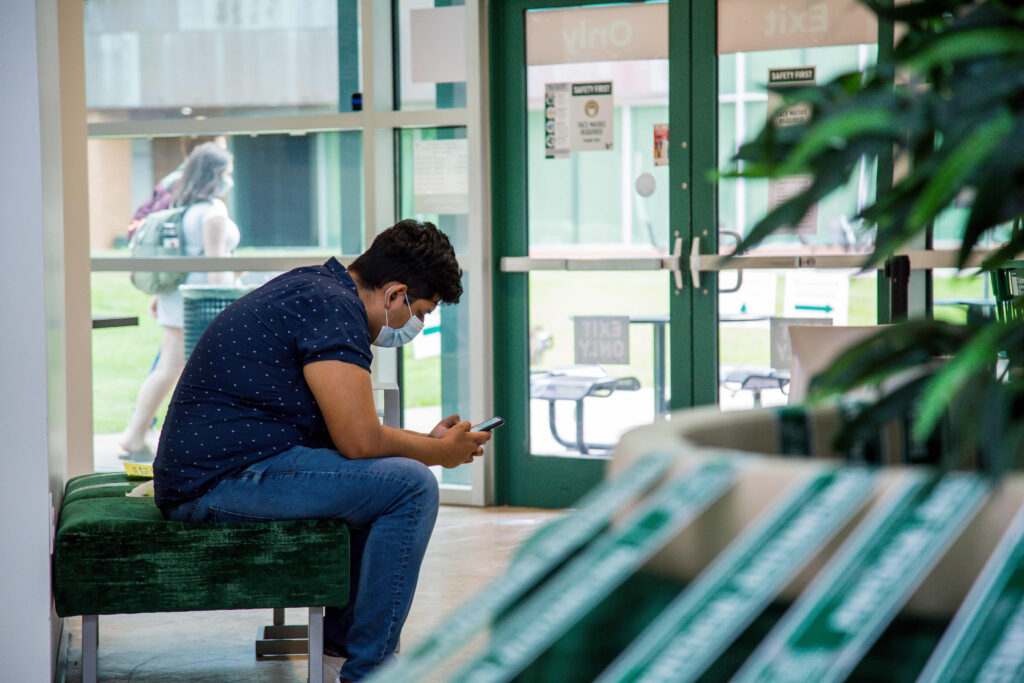OPINION: USF should require masks for in-person summer courses

USF announced May 18 it will be transitioning to pre-COVID-19 operations beginning June 28, the start of the Summer B semester, ending a yearlong mask requirement for students and faculty that has helped to keep its campuses safe.
The university’s plans to allow normal operation to continue followed a Centers for Disease Control and Prevention (CDC) announcement May 13 that those who are fully vaccinated don’t need to wear masks indoors or outdoors. USF has already begun removing the signs around campus enforcing the use of face masks and social distancing guidelines.
It’s far too early in the vaccination period, however, to allow students and faculty to be maskless on campus.
The CDC’s recommendation shouldn’t have influenced the elimination of the on-campus mask mandate since USF will not be able to tell who’s vaccinated against COVID-19 and who isn’t, allowing anyone to get rid of their masks within classrooms that will be at 100% capacity. Instead, USF should still require masks through the summer to prevent the continued spread of the virus.
President Joe Biden told CNN in February he planned to provide access to the vaccines for every American who wished to receive the vaccination by August at the latest, but USF’s Summer B would already be almost over at that point.
The Pfizer-BioNTech, Moderna and Johnson and Johnson vaccines have been available to college-aged Floridians since April 5, yet 35% of Floridians over 18 still not received the vaccine, according to a May 23 report by the U.S. Department of Health, leaving them and those around them at risk of contracting and spreading COVID-19. Those who have not been vaccinated will not be required to wear masks in classrooms this summer, but that shouldn’t be the case.
“If you’re not vaccinated, you must wear a mask, because that is the most attractive thing that we can have right now in order to stop transmission if you’re not vaccinated,” said Dr. Edwin Michael, a professor at USF’s College of Public Health, in a May 24 interview with The Oracle.
Despite USF’s decision to end its indoor mask requirements for Summer B, students and faculty should continue to wear a mask no matter their vaccination status.
The vaccine also only temporarily guarantees immunity, according to the CDC, requiring booster shots in the future that haven’t been developed yet. Some vaccines may also fail to work against new variants and mutations of COVID-19 that are developing rapidly outside of the U.S. and slowly being contracted within the country, like B.1.617 from India, which has now spread to 44 different countries, according to the CDC.
Due to the unclear nature of new variants and the lack of research around them, it would be unwise for students and staff to stop wearing masks on campus, no matter if they are completely vaccinated or not.
Herd immunity, in which such a large portion of the population gets vaccinated against a virus that overall immunity is achieved, is predicted to be reached by vaccinated Americans in August, according to Michael. This is two months after the beginning of USF’s Summer B semester, leaving plenty of time for the virus to continually spread and for an outbreak to occur on campus.
“If, let’s say, more than 50% [of students] come back vaccinated, and that’s quite a strong protection, that’s not enough in order to stop any outbreak,” said Michael. “You still have to [wear a mask].”
Some schools have begun to require students and faculty to be vaccinated before returning to campus, like California State University and Columbia University, but mandating vaccines is not the correct solution. Although it is important that all citizens attempt to prevent the spread of COVID-19, forcing students to obtain the vaccine can be seen as USF infringing on its students’ rights to choose whether or not they would like to be vaccinated.
USF shouldn’t allow students and faculty to stop wearing masks this summer in order to prevent furthering the spread of COVID-19. It is careless of the university and unfair to those who have tried hard to end the pandemic as soon as possible by steering clear of enclosed spaces and social distancing since March 2020.






